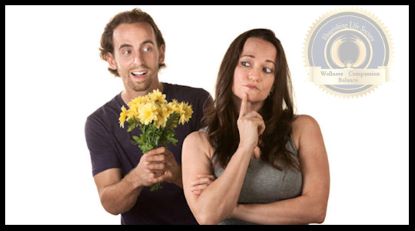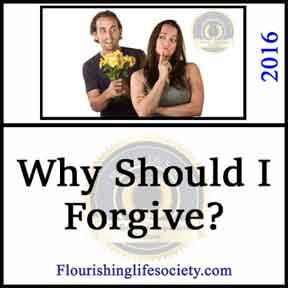Why Should I Forgive?
Moving Forward After Injury
BY: T. Franklin Murphy | June 1, 2016 (modified January 6, 2023)
BY: T. Franklin Murphy | June 1, 2016 (modified January 6, 2023)
|
We shouldn't forgive in smug self-righteousness, but moving forward requires us to forgive, serving us personally and society well.
“To forgive someone you believe has hurt, harmed, or violated you is no easy feat. However, doing so is a spiritual mandate for your healing, learning, and growth." Iyanla Vanzant
The concept makes perfect sense; the actual act of forgiving is the challenge. When we are wronged, we feel angry, sad or afraid. We feel the experience. When we attribute the wrong to a person or group of people, we create a grudge. Thoughts of this person (or group) continue to generate bad feelings long after the unpleasant moment. Memories are an evolutionary protection system, warning of possible danger. We were wronged; we store implicit and explicit memories of the event to protect from reoccurrences. Being wronged is a complex event consisting of more than a bad action that hurt us. By embracing the complexity of experience, we expand understanding to assist with giving forgiveness. Subjective InterpretationsExpectations, biases, and personal meanings intertwine to generate the feeling knocking us off kilter. We know something is wrong (because we felt it) and we seek explanations. If we can identify a cause, we can address it. But we tend to simplify causes while minimizing our role. We even seek support of our limited assessment by rallying friends and family behind our victimization. We probe supporting others, “She was wrong, right?” or “I don’t think he should’ve acted that way?”
Other times we abandon caution and blindly assume our perceptions are correct and attack with viciousness, presenting a demonizing portrayal of the accused and a sanitized presentation of self. Friends and family eager to please join the destructive frenzy, duped by our structuring of the events, they defend. Relationships and Heightened EmotionWe need others; healthy connections pay significant dividends. Relationship skills provide a host of survival benefits. The importance of relationships magnifies the intensity of emotions, pushing actions to gain acceptance, recognition, and status. Within reason, these drives serve us well. When out of balance, they become destructive.
Because of the strong connection between relationships, survival and well-being, our brains strenuously attend to conflicts. We pine over hurts and develop theories. Gossip and judgment swells in the competitive world of connections. When a relationship momentarily stings, we interpret the event, drawing more meaningful implications. We can shamefully accept inaptitude for relationships or brazenly affix blame outside our control. To escape the fear of relationship ineptness, we tend to focus on the wrongfulness of the other, justifying the pain; they, we reason, rightfully deserve our condemnation. Forgiving doesn’t require dismissing natural consequences. When a partner carelessly violates trust, we naturally erect protective walls to limit future vulnerability. Rebuilding trust only occurs from consistent expressions of sincere change. Forgiveness doesn’t include ignoring protective measures in the future.
|

